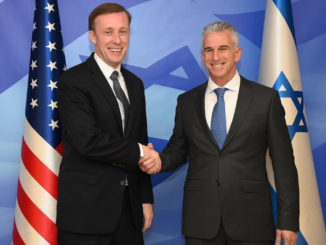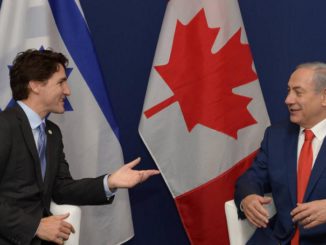
By Jim Miles
Once again Canada clearly signals its vassal status in relations with the U.S. The recent arrest and detention of Meng Wanzhou, Huawei Technologies’ chief financial officer, demonstrates fully Canadian compliance with U.S. desires.
Canadian authorities, notably Foreign Affairs Minister Chrystia Freeland and PM Justin Trudeau provide two defenses for Canada’s actions: the first is the tried and not so true “rule of law” axiom; the second is another canard, “there is nothing political” about Canada’s actions. Both are used repetitively on the news cycle and both are completely false.
International law
The Joint Comprehensive Plan of Action is an agreement between Iran, the U.S., Russia, China, France, U.K., and Germany in order to limit what nuclear activities are available to Iran. The plan is truly comprehensive. After a leading section on principles and general provisions, a much longer and much more technical section follows defining what activities are allowed and not allowed, and after that is another long section clearly outlining what sanctions are being lifted against Iranian personnel and assets.
Two other important sections are included. The first is an extensive presentation on the extensive rights of the IAEA to inspect and verify whether Iran is upholding its end of the agreement. Another section outlines a joint dispute resolution mechanism.
Following the writing of the agreement, it was placed into international law by UNSC Resolution 2231(July 20, 2015) noting the roles of the agreeing countries, the role of the IAEA for inspections, and a reiteration concerning the principles of the Nuclear Non-Proliferation Treaty.
It is an impressive document, not the usual UNSC one or two-page document condemning or confirming some action somewhere, but a lengthy and detailed presentation on the limits imposed upon Iran and the subsequent lifting of sanctions imposed in earlier resolutions.
As everyone knows or should know, the U.S. unilaterally abrogated its participation in the agreement without any effort to use the joint dispute resolution (probably knowing it would be ruled against).
It is clearly a politically motivated action, caught up with all the usual U.S. hubris and arrogance concerning its hegemonic desires in the Middle East including containment of Russia and China and its fawning support of Israel. All the previous sanctions were unilaterally re-imposed on Iran by the U.S.
To their credit, the other members of the JCPOA have upheld the agreement. The problem with that is the U.S. essentially controls the world banking system and can isolate and attack both corporations and states with sanctions and embargoes through its own belief in its extraterritorial laws.
Non-compliance leads to lawsuits imposed in the U.S. and applied externally. As an example, under the “Trading With the Enemy Act” one of France’s largest banks, Societe Generale, agreed to pay $1.34 billion to US federal and state authorities to settle a legal dispute over violations of US trade sanctions against Iran and other countries.
Canada’s “rule of law” lie
After all that preamble (and yes I did read the first sections of the JCPOA and UN2231 and scanned the rest) it is obvious that Canada is not acting according to the rule of law.
Of course, their argument will be about the extradition treaty Canada has with the U.S. (and many other countries of the world) while dutifully ignoring that the reason for the arrest – while not clearly defined by U.S.authorities but certainly related to the abrogation of both UNSC 2231 and the JCPOA – is completely unlawful.
I must give credit to CBC for its interview with Jeffrey Sachs, a professor at Columbia University, known as one of the world’s leading experts on economic development and the fight against poverty. [As a side note, it was the application of some of his economic principles creating the “shock doctrine” disaster that occurred when the Soviet Union collapsed leading, ironically, to the rise of Vladimir Putin.]
Sachs indicated that Canada’s action was “extraordinarily provocative” and “completely in violation of….completely outside” of international law. He noted that the arrest was without precedent, as HSBC – a British multinational banking and financial services holding company – had been charged with sanctions violations larger than that of Huawei without anyone being arrested (as with the Societe Generale, above).
Canada’s excuse is only good for domestic news cycles. As typical of Canada’s actions, the government pretends it has nothing to do with the action, supporting the action with the lie concerning rule of law. All it does is demonstrate Canada’s vassal status to the U.S. and Trudeau’s and Freeland’s subservience to U.S. wishes.
Canada is not part of the JCPOA, but as a signatory to the United Nations, it is thereby agreeing to UN “rules of law”. By supporting the U.S., it stands outside the law, acting as a pawn in the U.S. attempts to control the world through illegal sanctions and illegal extraterritoriality proceedings.
Not political…really!?
The other argument about it not being political is simply an outright lie, a cover story in order to give a short answer to the media without admitting anything about Canada’s subservience to U.S. extraterritoriality.
There is everything political about the arrest as it concerns a high-level international executive, one related to China’s central power structures, with the incredible description of it being because of Meng Wanzhou’s business discussions going against U.S.’ illegal sanctions and U.S. abrogation of international law concerning Iran.
In most areas, Canada has shown its support for U.S. foreign policy. This case further entrenches Canada into its position of servile vassalage to U.S. interests.
– Jim Miles is a Canadian educator and a regular contributor/columnist of opinion pieces and book reviews to Palestine Chronicles. His interest in this topic stems originally from an environmental perspective, which encompasses the militarization and economic subjugation of the global community and its commodification by corporate governance and by the American government.

– Jim Miles is a Canadian educator and a regular contributor/columnist of opinion pieces and book reviews to Palestine Chronicles. His interest in this topic stems originally from an environmental perspective, which encompasses the militarization and economic subjugation of the global community and its commodification by corporate governance and by the American government.







